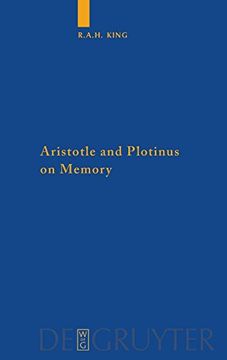Share
Aristotle and Plotinus on Memory (in English)
Richard A.h. King (Author)
·
De Gruyter
· Hardcover
Aristotle and Plotinus on Memory (in English) - Richard A.H. King
Choose the list to add your product or create one New List
✓ Product added successfully to the Wishlist.
Go to My WishlistsIt will be shipped from our warehouse between
Tuesday, July 30 and
Wednesday, July 31.
You will receive it anywhere in United States between 1 and 3 business days after shipment.
Synopsis "Aristotle and Plotinus on Memory (in English)"
Two treatises on memory which have come down to us from antiquity are Aristotles On memory and recollection and Plotinus On perception and memory (IV 6); the latter also wrote at length about memory in his Problems connected with the soul (IV 3-4, esp. 3.25-4.6). In both authors memory is treated as a modest faculty: both authors assume the existence of a persistent subject to whom memory belongs; and basic cognitive capacities are assumed on which memory depends. In particular, both theories use phantasia (representation) to explain memory.Aristotle takes representations to be changes in concrete living things which arise from actual perception. To be connected to the original perception the representation has to be taken as a (kind of) copy of the original experience - this is the way Aristotle defines memory at the end of his investigation.Plotinus does not define memory: he is concerned with the question of what remembers. This is of course the soul, which goes through different stages of incarnation and disincarnation. Since the disembodied soul can remember, so he does not have Aristotles resources for explaining the continued presence of representations as changes in the concrete thing. Instead, he thinks that when acquiring a memory we acquire a capacity in respect of the object of the memory, namely to make it present at a later time.
- 0% (0)
- 0% (0)
- 0% (0)
- 0% (0)
- 0% (0)
All books in our catalog are Original.
The book is written in English.
The binding of this edition is Hardcover.
✓ Producto agregado correctamente al carro, Ir a Pagar.

